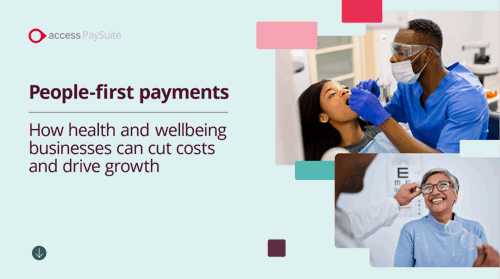
The patient experience in private healthcare and wellbeing goes beyond the services provided to encompass how easily individuals can access and pay for those services. Every interaction from scheduling an appointment to completing treatment shapes their perception of the quality of care received.
The payment methods in the healthcare and wellbeing sector have undergone significant changes in recent years. From traditional cash payments to modern digital platforms, there is now a wide range of options available. Organisations in this sector must recognise the significance of providing multiple payment choices to improve the client experience and adopt a comprehensive and client-centric approach.
Importance of payment diversity in enhancing the client experience
Understanding your clients' preferred payment methods is crucial as they have varying preferences. Our research shows that 38% of clients prefer traditional methods like credit/debit cards, while 8% favor digital wallets, 28% opt for direct bank transfers or Open Banking, and some prefer alternative options like buy now, pay later (BNPL) services.
Offering a variety of payment options contributes to a positive client experience, with 33% of clients considering flexible payment options as a top priority from their provider. This client-centric approach ensures that individuals can access services in a way that suits their lifestyle and preferences.

Embracing digital wallets and contactless payments
Embracing digital wallet solutions facilitates seamless and contactless transactions. The rise of mobile payment apps enables clients to make payments using their smartphones, enhancing convenience and promoting a modern and tech-savvy image for businesses. Research shows that 22% of clients prioritise mobile payments from their private healthcare or wellbeing provider.
Offer subscription and membership plans for structured payments
Introducing subscription-based or membership plans can be beneficial for clients who prefer a more structured and predictable payment model. These plans can offer bundled services, providing clients with a sense of exclusivity and value. 30% of private healthcare and/or wellbeing clients consider the ability to spread payments important to them.

Flexible payment timelines to accommodate various budgetary needs
Recognising that clients may face different financial situations, offering options for flexible payment timelines can be beneficial. This can include offering installment plans or staggered payment schedules to accommodate various budgetary needs. Providing flexibility in payment timelines ensures that clients can receive the care they need without financial strain.
Prioritising security and compliance in payment transactions
Prioritising security in payment transactions is crucial to protect sensitive client information. Compliance with industry regulations is essential to build trust and maintain the confidentiality of client data. Research shows that security is of significant importance to 38% of patients and clients of self funded healthcare.

Benefits of diverse payment methods in private healthcare
- Convenience and accessibility: Diverse payment methods in bring about increased convenience and accessibility for patients. Rather than being limited to traditional payment options, patients now have the flexibility to choose from a variety of alternatives. These alternatives include credit/debit cards, mobile payment apps, and online portals. This allows patients to pay for services in a manner that aligns with their preferences and lifestyle.
- Streamlined processes: By embracing diverse payment methods, private healthcare facilities can streamline their administrative processes. Electronic payment systems and online portals automate payment processing, reducing the need for manual intervention and paperwork. This improvement in efficiency minimizes the likelihood of errors or delays in payment processing. Consequently, administrative staff can devote more time and attention to delivering personalized care to patients.
- Financial transparency: Engaging with patients to reduce payment stress is crucial. By integrating patient expectations into business strategies and ensuring transparency about costs, healthcare providers can alleviate financial pressure and enhance patient repayment experiences.
- Enhanced security: Diverse payment methods offer enhanced security features such as encryption, tokenization, and fraud detection mechanisms, safeguarding patients' sensitive information and financial data. Patients can trust that their transactions are protected against unauthorised access or fraudulent activities, enhancing their overall sense of trust and satisfaction in the healthcare provider.
- Inclusive access: Diverse payment methods contribute to inclusive access by accommodating patients with varying socioeconomic backgrounds and financial circumstances. Offering installment payment plans or accepting healthcare financing options makes essential treatments more affordable and accessible to those facing financial constraints.
Navigating the complexities of diverse payment methods in private healthcare
While diverse payment methods offer numerous benefits, they also present challenges and considerations for healthcare providers. Integrating and managing multiple payment systems can be complex and resource-intensive, requiring investment in technology, staff training, and compliance with regulatory requirements. Moreover, ensuring the security and privacy of patient data remains a constant priority amidst the evolving landscape of cyber threats and data breaches.
This is where a payment processing provider can step in and alleviate these challenges. By partnering with a reliable payment processing provider, healthcare providers can streamline their payment operations and overcome the complexities associated with managing multiple payment systems.
“Access PaySuite has played a significant role in improving patient satisfaction and I’d recommend it to any type of business looking to grow its membership base or those that rely on regular, recurring income.”
- Dr Zahir Kaderbhai, Director at Thurmaston Dental Practice
By providing advanced technology solutions that integrate seamlessly with existing systems, payment processes are simplified and the burden on staff is reduced. Additionally, payment processing providers specialise in ensuring the security and privacy of sensitive patient data. They employ robust encryption and security measures to protect against cyber threats and data breaches.
By outsourcing payment processing to a trusted provider, healthcare providers can have peace of mind knowing that their patients' information is in safe hands. payment experience, healthcare providers can create a seamless and satisfying experience for their patients.
People-first payments for the healthcare and wellbeing industry

Aimed at healthcare and wellbeing businesses of all sizes, this guide will break down some of the biggest consumer trends influencing the sector today and explain how to harness your payment systems to improve customer experience, while maintaining compliance and maximising efficiency.